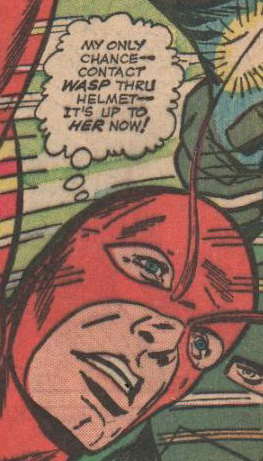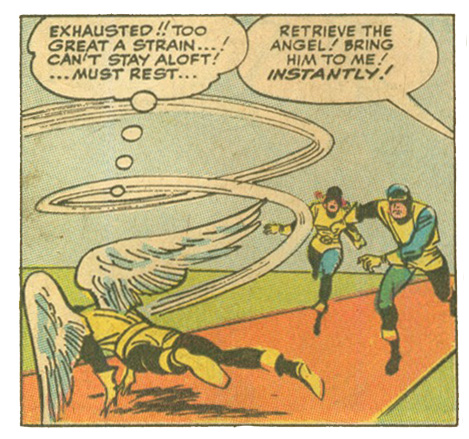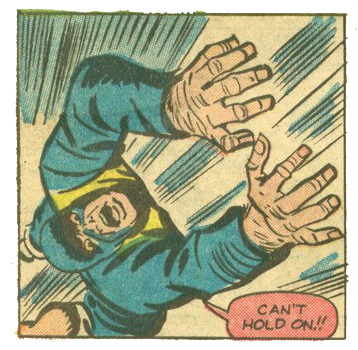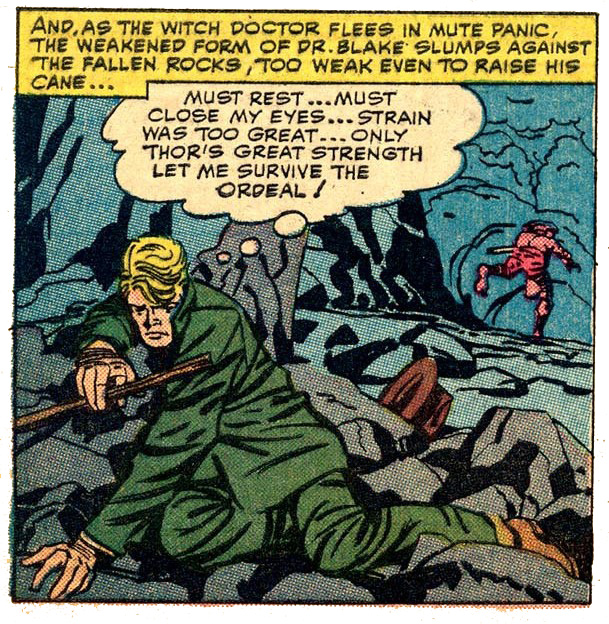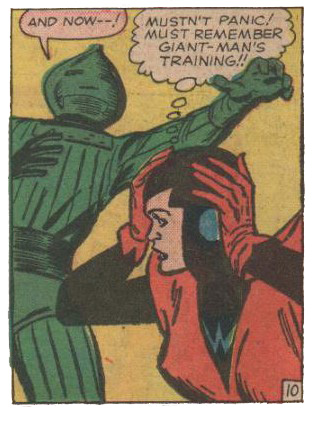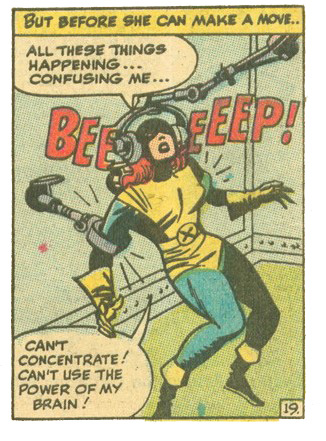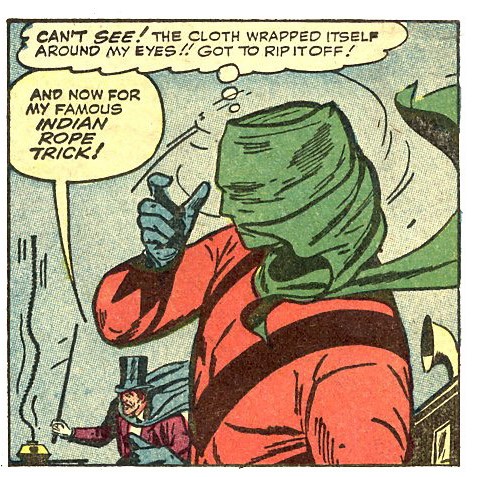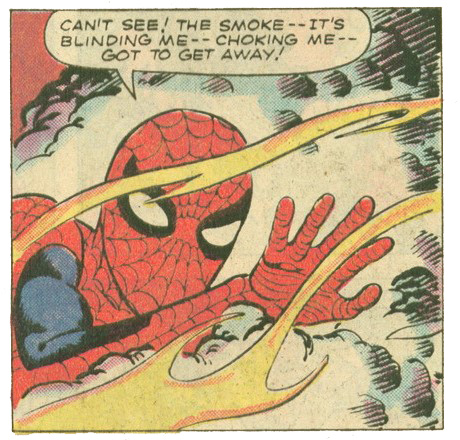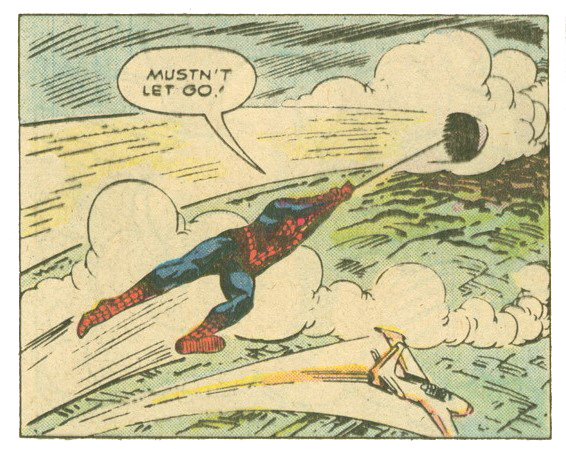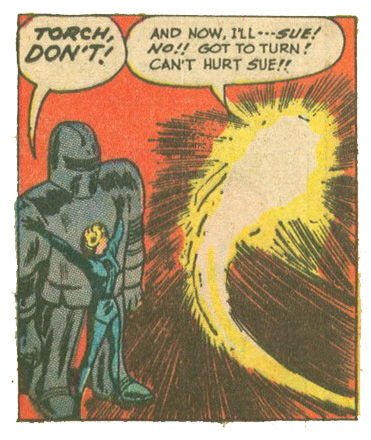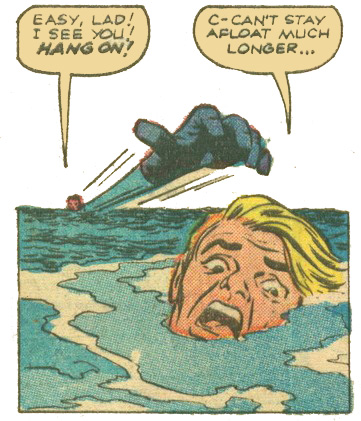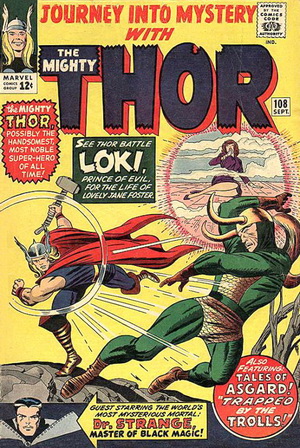
Published: September, 1964
Script: Stan Lee
Pencils: Jack Kirby
Inks: Chic Stone
Letters: Art Simek
Some of the best drama in the world arises out of the inability of human beings to communicate effectively with one another. Think: every adaptation of Romeo and Juliet, Dustin Hoffman in Rain Man, Cool Hand Luke. Even better, some of the best comedy arises from this same delicacy of the human condition. Think: Abbott & Costello’s Who’s on First?, all the Hollywood Screwball comedies of the 30’s and 40’s, and just about every wordever written by the incomparable P. G. Wodehouse.
When it comes to the literary delights brought on by a lack of communication, Marvel has no intention of being left behind. Almost every romantic relationship in the pages of these early comics is solidly based on the two parties keeping their feelings secret from each other. This results in oodles of delicious soap opera, but let’s not stop there! In this latest installment of Thor’s adventures, the ladies don’t enter into it at all. This is all about MEN communicating badly, and behaving even worse. Let’s take a look.
IS IT BLUE AND BLACK…OR WHITE AND GOLD?
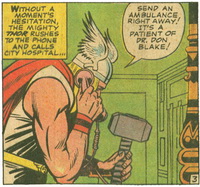
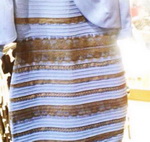 But before we even get started, this is just too good to pass up, and actually illustrates my point perfectly. Remember the recent internet controversy over whether the dress was blue and black, or white and gold? BTW, it’s white and gold, though some people’s eyes for some bizarre reason simply don’t see it that way. Well, on the bottom of page three, either “The Man of the Hour!” inker Chic Stone forgot to color in Thor’s tunic, or Thor has just jumped on this latest fashion trend of the indescribable fabric. Correct me if I’m wrong, but in this panel, Thor’s tunic is white and gold. Not the usual black and blue.
But before we even get started, this is just too good to pass up, and actually illustrates my point perfectly. Remember the recent internet controversy over whether the dress was blue and black, or white and gold? BTW, it’s white and gold, though some people’s eyes for some bizarre reason simply don’t see it that way. Well, on the bottom of page three, either “The Man of the Hour!” inker Chic Stone forgot to color in Thor’s tunic, or Thor has just jumped on this latest fashion trend of the indescribable fabric. Correct me if I’m wrong, but in this panel, Thor’s tunic is white and gold. Not the usual black and blue.
I know, I know. My reading copy of this story is from a reprint, so it may simply be a matter of the colorist slacking off at his job, or a reprint somehow printing badly (and further investigation confirms the original image appeared in full color), but you’ve got to admit, it hearkens forward to the famous internet dress, which proves to us that everybody sees things differently.
It’s all about perception. And emotion.
ODIOUS ODIN
So! Now that we’ve laid the groundwork, let’s get started. Our first major miscommunication happens when Dr. Blake is so busy operating on the ailing Dr. Strange that he doesn’t have a free hand to pick up the phone and tell Odin, “Look, Dad—I’ll call you back. Just so happens I’m in the middle of saving somebody’s LIFE at the moment!”
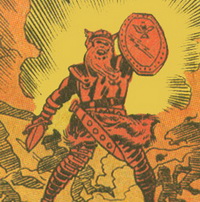 Not that Odin would have much concern over one measly human life, but he sure doesn’t take kindly to being ignored. In fact, I’d say his petty insistence on an immediate response amounts to a god complex. Wait…Oops, I forgot. Odin IS a god. But not a very nice one. When Thor doesn’t answer him “in that very split second,” Odin flies into a rage and causes an electrical storm. He doesn’t wait for an explanation. He doesn’t WANT an explanation. His final word on being ignored: “The Thunder God shall feel my wrath!” He’s behaving more like a spoiled two-year-old than someone worthy of worship. Sorry, but a juvenile inability to control one’s emotions is not a hallmark of any “god” I want to know.
Not that Odin would have much concern over one measly human life, but he sure doesn’t take kindly to being ignored. In fact, I’d say his petty insistence on an immediate response amounts to a god complex. Wait…Oops, I forgot. Odin IS a god. But not a very nice one. When Thor doesn’t answer him “in that very split second,” Odin flies into a rage and causes an electrical storm. He doesn’t wait for an explanation. He doesn’t WANT an explanation. His final word on being ignored: “The Thunder God shall feel my wrath!” He’s behaving more like a spoiled two-year-old than someone worthy of worship. Sorry, but a juvenile inability to control one’s emotions is not a hallmark of any “god” I want to know.
Of course, Odin’s under a great deal of stress at the moment. He’s about to lead his warriors into battle, and by golly, having Thor by his side sure would make the job easier. So I can almost understand his flying off the handle…if we didn’t have to go back to all that business about him being a GOD. If you’re a “good guy” god, there’s really no excuse for behaving badly.
Later, Odin calms down when he sees how valiantly Thor battles Loki. Odin is proud of Thor for that, but no mention is made of his own behavior, and no apology given. He completely glosses over what an unreasonable jackass he’s been.
Odin….not my favorite character.
LOATHSOME LOKI
Loki, on the other hand, is always one of my favorite characters, and here he gives a performance as his typically despicable self, which is no surprise, especially considering that on page six, the narrator promotes him from the God of Mischief to the God of Evil. I’m not sure I’m on board with Loki 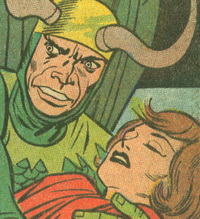 as “The God of Evil.” Yes, he’s troublesome, but I’d like to reserve this most powerful of monikers for someone whose villainous agenda springs from a well deeper than sibling rivalry.
as “The God of Evil.” Yes, he’s troublesome, but I’d like to reserve this most powerful of monikers for someone whose villainous agenda springs from a well deeper than sibling rivalry.
Here’s a delicious morsel, where Loki is potentially at his most dangerous. I simply love this little throwaway line Loki utters as he notices how lovely Jane is…for a mortal. Whoa! Where did this come from? And more importantly, where is it going? If Loki really wants to stick it to Thor, what better way than to instigate a love triangle between two brothers at odds, and the woman Dad would never let either of them marry? So much soap opera potential!
And by the way, though Loki may look hideous to us in 1964 newsprint, apparently Jane doesn’t think so. Remember Loki’s debut, way back in JIM #85? Jane’s first impression was that “he seems so dashing and ROMANTIC!” Despite the horns and scaly yellow underpants, I think the girl could be persuaded.
TROUBLED THOR
So Loki behaves badly, as usual, but what about Thor? Mostly, he acts his usual heroic self, but he does have a pouty moment or two.
When Loki appears in Blake’s office as an old man, he stages a “Whoops!” moment so he can mix up his ordinary cane and Blake’s super-duper cane. Then old man Loki throws the super-duper cane out the window, leaving Blake powerless.
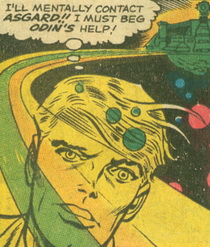 As soon as Blake realizes his magic cane is gone, his first thought is to contact Odin for help. Nothing wrong with that; that’s what family is for, right? But when Odin doesn’t immediately answer his mental summons, Blake is “bitterly disappointed” and assumes Odin is ignoring him, and has forsaken him.
As soon as Blake realizes his magic cane is gone, his first thought is to contact Odin for help. Nothing wrong with that; that’s what family is for, right? But when Odin doesn’t immediately answer his mental summons, Blake is “bitterly disappointed” and assumes Odin is ignoring him, and has forsaken him.
Odin, you’ll remember, is on the battlefield at that very moment, leading his warriors in a crusade against evildoers. Have these few years on Earth caused Thor to so quickly forget that in Asgard stuff like this happens on a fairly regular basis? If someone’s not picking up the phone, maybe they’re not being obstinate and difficult. Maybe there is in fact a really good reason.
Of course, it’s also possible Blake is remembering that earlier, he ignored Odin’s call, and figures that Odin playing tit-for-tat is just like dear old dad.
HOW DID YOU GET THIS NUMBER?
Realizing no help is coming from Asgard, Thor turns to his new friend, Dr. Strange. Earlier, Blake saved Strange’s life (though it’s unclear how a medical procedure could remedy a mystical curse), and Strange offered his own unique brand of assistance, should Blake ever require it. So now Blake asks Strange to find his missing walking stick. Which Strange does, no questions asked.
A short time later, Thor tracks down Loki but not the kidnapped Jane, and panicking, once again turns to Strange for help, dialing him up on that mental partyline all superheroes apparently share. But remember: Strange offered his help to Blake, not Thor. Yet, he willingly complies again, because Thor makes his request “in the name of Don Blake.”
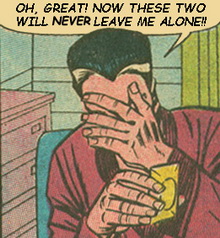 I wonder: About this time, is Strange sorry he ever got involved in all this mess? And more importantly, is he already cognizant of the peculiar connection between the mighty Thor and lil’ ol’ Dr. Blake?
I wonder: About this time, is Strange sorry he ever got involved in all this mess? And more importantly, is he already cognizant of the peculiar connection between the mighty Thor and lil’ ol’ Dr. Blake?
When Thor finds Strange collapsed on the floor, the magician breathes, “THOR—I sensed your presence — knew you’d come.” So, let’s think about this. Even when Strange is ill, he can “sense” Thor’s presence. Because Thor is a superhero, with a super powerful aura? Or can Strange sense anyone’s presence at any time?
For the sake of argument, let’s say Strange could only “sense Thor’s presence” because he’s a god. Next question: can Strange still sense the same presence even after Thor taps his hammer and reverts to Blake? Surely Thor’s “presence” still exists within Blake, and would be evident to one with Dr. Strange’s mystical powers.
With everything that’s happened in this story, it’s hard to believe Dr. Strange doesn’t understand the unique relationship between Blake and Thor. But even so, he wisely chooses to say nothing.
The mature and debonair Dr. Strange is just about the only man in this story who understands what’s going on, communicates only as much as needed, and does not behave badly.
WHEN SPEECH SUFFERS
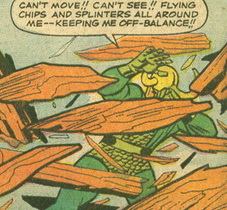 Except for one thing. Strange, in his weakened state, does fall victim to a certain anomaly of the Marvel Universe: When someone is in despair or confusion, language is the first casualty. In Strange’s case, it’s prepositions. Observe how, when feverishly ill, he explains to Thor, “Mordo–tried to use magic spell on city—but—spell was too strong—weakened me—Uhhhh—”
Except for one thing. Strange, in his weakened state, does fall victim to a certain anomaly of the Marvel Universe: When someone is in despair or confusion, language is the first casualty. In Strange’s case, it’s prepositions. Observe how, when feverishly ill, he explains to Thor, “Mordo–tried to use magic spell on city—but—spell was too strong—weakened me—Uhhhh—”
Loki, too, with all his powers of mischief and evil, is not immune. While Strange loses his prepositions, Loki suffers from a lack of pronouns. Pelted by Thor with broken tree limbs, Loki screams, “Can’t move!! Can’t see!!” How many times before have we heard exclamations like this?
BE STILL, MY HAMMER!
But in their despair and confusion, both can be forgiven for forgetting the proper elements of speech. While their communication is weakened, it’s not obliterated. Thor, however, does not suffer any loss of language, even in the most trying of circumstances. In our last story, Thor voiced a godly concern about someone touching his hammer, and here he warns Loki, “Unhand my hammer! How dare you profane it with your vile touch!!”
Actually, that’s pretty much exactly what he said the last time. It’s a dire situation he most fervently wishes to avoid, so I guess he’s been practicing.
WHO’S GOING TO PAY FOR ALL THIS??
I’ve titled this post “Men Communicating Badly, and Behaving Worse,” and have one more point to make, though you’ll see that I’m stretching.
Early in the story, when Thor rips up some pavement to save a dumb kid who would rather be hit by a truck than lose his ball, we learn that the Avengers keep an emergency fund to reimburse the city for damages incurred as a result of their do-gooding. Wow! Really? First of all, is that FAIR? When they rescue innocent bystanders and fight the forces of evil, they’re actually behaving well, not badly, so why should they be held responsible for incidental repairs?
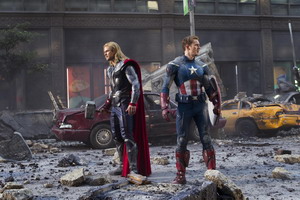 Secondly, how far does this go? Here, Thor merely breaks up some asphalt, but what if the damage is more serious? I have to imagine this emergency repair fund is mostly financed by Tony Stark’s pocket change, but even that will have its limits. For instance, we couldn’t really expect the Avengers to finance the cleanup after the Battle of New York (The Avengers, 2012). If this generous precedent doesn’t go unchecked, at some point, even our most well-meaning superheroes will have to calculate the cost before making a move.
Secondly, how far does this go? Here, Thor merely breaks up some asphalt, but what if the damage is more serious? I have to imagine this emergency repair fund is mostly financed by Tony Stark’s pocket change, but even that will have its limits. For instance, we couldn’t really expect the Avengers to finance the cleanup after the Battle of New York (The Avengers, 2012). If this generous precedent doesn’t go unchecked, at some point, even our most well-meaning superheroes will have to calculate the cost before making a move.
But now I’m thinking like someone in the real world. So on second thought, let’s change all this to a great big…NEVER MIND!
TRAPPED BY THE TROLLS
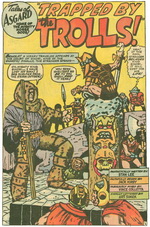 Finally, we have a short Tale of Asgard, in which young Thor frees his fellow Asgardians who are being held captive by trolls.
Finally, we have a short Tale of Asgard, in which young Thor frees his fellow Asgardians who are being held captive by trolls.
That’s all you need to know about this one.
Unless you want to ask the obvious question: Why didn’t the trolls confiscate Thor’s yellow sack before confining him to the dungeon? Of course, it wouldn’t have mattered much. As soon as they opened the sack, they would see Mjolnir, and immediately know it was Thor and they were doomed. Then the story would have been over in two pages instead of four. Which would have been fine. Either way, we get the point: even when Thor was making the adolescent error of wearing his hair like Farrah Fawcett-Majors, he was still a swell guy.
| Want to read this comic on your computer? Marvel has a scan! Want to own this story? Buy the Masterworks! |

